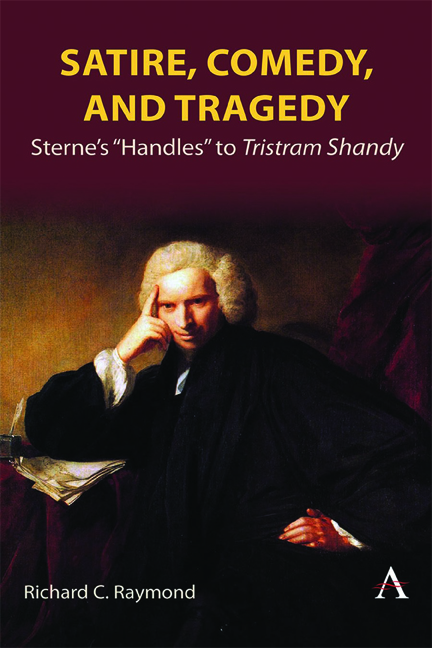Book contents
- Frontmatter
- Contents
- Preface
- 1 Walter, Toby, Tristram, and the Reader: Sterne’s Revision of “Dullness”
- 2 The Yorick Standard, Walter’s Benevolent Dullness, and Tristram’s Friends: The Plot of Satire in Tristram Shandy
- 3 “True Shandeism”: The Unhappy Comic Action in Tristram Shandy
- 4 Isolation and Death: The Tragic Undertones of Shandean Benevolent Dullness
- 5 Benevolent Dullness, Ambiguity, and the Reader: Modal Complexity and the Plots of Tristram Shandy
- 6 Laurence Sterne’s Letters
- 7 The Shandean Sermons of Parson Sterne
- 8 Parson Yorick in A Sentimental Journey and in A Continuation of Bramine’s Journal
- 9 The International Perspective on Tristram Shandy and the Argument
- References
- Index
5 - Benevolent Dullness, Ambiguity, and the Reader: Modal Complexity and the Plots of Tristram Shandy
Published online by Cambridge University Press: 01 March 2024
- Frontmatter
- Contents
- Preface
- 1 Walter, Toby, Tristram, and the Reader: Sterne’s Revision of “Dullness”
- 2 The Yorick Standard, Walter’s Benevolent Dullness, and Tristram’s Friends: The Plot of Satire in Tristram Shandy
- 3 “True Shandeism”: The Unhappy Comic Action in Tristram Shandy
- 4 Isolation and Death: The Tragic Undertones of Shandean Benevolent Dullness
- 5 Benevolent Dullness, Ambiguity, and the Reader: Modal Complexity and the Plots of Tristram Shandy
- 6 Laurence Sterne’s Letters
- 7 The Shandean Sermons of Parson Sterne
- 8 Parson Yorick in A Sentimental Journey and in A Continuation of Bramine’s Journal
- 9 The International Perspective on Tristram Shandy and the Argument
- References
- Index
Summary
Having analyzed the satiric, comic, and tragic actions that form the plots of Tristram Shandy, we might adopt the posture of Shakespeare's Polonius, who would only have to decide whether Sterne's work should be labeled tragicomic satire or satiric tragicomedy. Indeed, one might legitimately question the usefulness of the definitions of satire, comedy, and tragedy borrowed here from the work of Alvin Kernan and Northrop Frye, as none of these definitions, by itself, lets us describe the complex action of Tristram Shandy.
Frye himself would have answered this question, I believe, by pointing out that modal complexity represents the hallmark of great literature. The tragic action of Tristram Shandy, as we have seen in Chapter 4, can be partly categorized under Frye's “high mimetic” mode, in which protagonists Yorick and Tristram stand strong in their bold criticisms of grave, reputable dullness. Yet ironically, as Yorick and Tristram come to recognize, their strong moralrhetorical stances leave them weak, vulnerable to the swarms of the dull who come together long enough to slander and destroy.
We have also seen the tragic action of Tristram Shandy blend with comic action as it falls to what Frye would call the “low mimetic” stories of Walter and Toby, stories inseparable from Tristram’s. In telling the stories of his precursors, Tristram illustrates the benevolent “moral character” he would place at the center of a new comic Shandean society, which he would populate with his “hearty, laughing” friends (2: 132; 4: 402). But as we have discovered, within the fictional world created by Sterne, neither Tristram nor his forebearers succeed in drawing friends, in renewing life on the foundation of society's ruins. Tristram, Walter, and Toby may all be fairly counted among the protagonists of “low mimetic” tragedy, for they find themselves excluded from the society they would regenerate (Frye 1957, 39). But this bimodal action, we have found, does not resolve tragically, as Tristram resurrects Yorick regularly and ends his cock-and-bull story with a joke, not with a catastrophe. Neither does the action resolve comically, for despite the joking at the end, we find no harmony, no regeneration, and no shared vision—only Toby's embarrassment, Mrs. Shandy's confusion, and Walter's rhetorical nonsense (9: 803–9).
- Type
- Chapter
- Information
- Satire, Comedy and TragedySterne's 'Handles' to <i>Tristram Shandy</i>, pp. 103 - 116Publisher: Anthem PressPrint publication year: 2023



